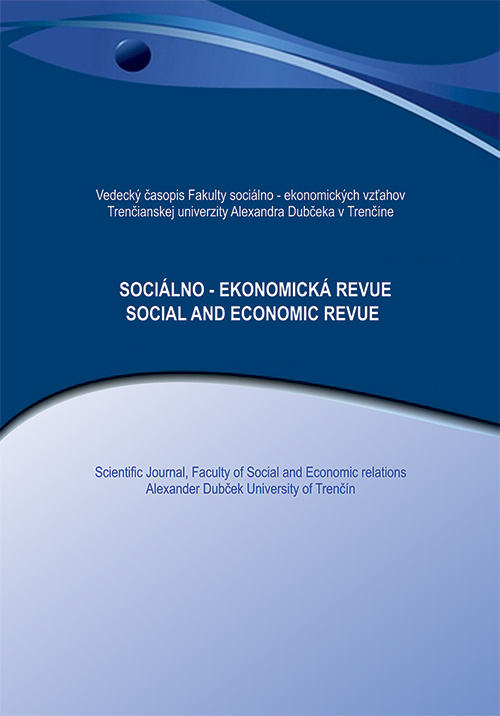EMPLOYMENT OF GENERATION Y, Z IN THE LABOR MARKET IN THE CONDITIONS OF THE INDUSTRY 4.0 CONCEPT
The change in the structure of the labor market in recent years has been largely influenced by the rapid robotization and automation of industries associated with the Industry 4.0 initiative, globalization and an important factor are demographic changes implying a possible demographic crisis. All these factors bring challenges to both current and future generations in the labor market. However, their successful management also depends on the economic policy actors involved in labor market policy-making, which should aim to ensure the functioning of the market. In the presented article we want to point out how the employment (employment) of generation y, z changes on the labor market in the concept of Industry 4.0.
Release: 2020/2 Pages: 38-44 JEL classification: O30, M52, J20
DOI:
Keywords: industry 4.0, generation y, z, labor market, employment
Section:
Contacts:
Ing. Simona Hyžová
Ing. Kamila Mayerová
Department of Management and Human resources development,
Faculty of Social and Economic Relations,
Alexander Dubček University of Trenčín
Študentská 3, 911 50 Trenčín
e- mail: simona.hyzova@tnuni.sk
e- mail: kamila.mayerova@tnuni.sk
Literature:
BENCSIK, A., HORVÁTH-CSIKÓS, G., & JUHÁSZ, T. (2016). Y and Z Generations at Workplaces. Journal of Competitiveness, 8, s. 90-106. doi:10.7441/joc.2016.03.06.
BROŽOVÁ, D. (2012). Kapitoly z ekonomie trhů práce (1. vyd.). Praha, Česká republika: Oeconomica.
DELOITTE. (2018). The Deloitte Millennial Survey 2018: Millennials’ confidence in business, loyalty to employers deteriorate. [online]. [cit. 2020-04-11]. Dostupné na: <https://www2.deloitte.com/content/dam/Deloitte/global/Documents/About-Deloitte/gx-2018-millennial-survey-report.pdf>.
DELOITTE. (2019). The Deloitte Global Millennial Survey 2019. [online]. [cit. 2020-04-11]. Dostupné na: <https://www2.deloitte.com/content/dam/Deloitte/global/Documents/About-Deloitte/deloitte-2019-millennial-survey.pdf>.
DIMOCK, M. (2019). Defining generations: Where Millennials end and Generation Z begins. [online]. [cit. 2020-04-11]. Dostupné na: Pew Research Center: <https://www.pewresearch.org/fact-tank/2019/01/17/where-millennials-end-and-generation-z-begins/>.
GILCHRIST, Alasdair. Industry 4.0: the industrial internet of things. Berkeley: Apress, 2016. ISBN 978-1-4842-2046-7.
HABÁBIK, J. a kol. 2014. Príklady a úlohy z makroekonómie. Trenčín: TNuNI FSEV. ISBN 9978-80-8075-659-8.
KACZOR, P. (2013). Trh práce, pracovní migrace a politika zaměstnanosti ČR po roce 2011 (1. vyd.). Praha, Česká republika: Oeconomica.
KAPOOR, C., & Solomon, N. (2011). Understanding and managing generational differences in the workplace. Worldwide Hospitality and Tourism Themes, 3, s. 308-318.
KUCHAŘ, P. 2007. Trh práce : sociologická analýza. Praha: Karolinum. ISBN 978-80-246-1383-3.
MANPOWER. 2020. Ako vyriešiť nedostatok talentov: Čo zamestnanci chcú. [online]. [cit. 2020-04-11]. Dostupné na: <https://www.manpower.sk/manpower/sk/ako-vyriesit-nedostatok-talentov-co-zamestnanci-chcu-2020//>.
MAŘÍK, V. a kol.. Průmysl 4.0: výzva pro Českou republiku. Praha: MANAGEMENT PRESS, 2016. ISBN 978-80-7261-440-0.
McCRINDLE, M. (2014). The ABC of XYZ: Understanding the Global Generation (3. vyd.). McCrindle Research.
MOHR, K. A., & MOHR, E. S. (2017). Understanding Generation Z Students to Promote a Contemporary Learning Environment. Journal on Empowering Teaching Excellence, 1(1), s. 84-94. doi:https://doi.org/10.15142/T3M05T.
SCHWAB, K. (2016). The Fourth Industrial Revolution. Dostupné na: <https://luminariaz.files.wordpress.com/2017/11/the-fourth-industrial-revolution-2016-21.pdf>.
SEEMILLER, C., & GRACE, M. (2016). Generation Z Goes to College. John Wiley & Sons.
TOLBIZE, A. (2008). Generational differences in the workplace. Research and Training Center on Community Living, 5(2), s. 1-21. Dostupné na: <http://rtc3.umn.edu/docs/2_18_Gen_diff_workplace.pdf>.
SOLNET, D., KRALJ, A., & KANDAMPULLY, J. (2012). Generation Y Employees: An Examination of Work Attitude Differences. The Journal of Applied Management & Entrepreneurship, 17(3), s. 36-54. Dostupné na: <https://www.researchgate.net/profile/Jay_Kandampully/publication/260146142_Generation_Y_Employees_An_Examination_of_Work_Attitude_Differences/links/54257ffd0cf2e4ce94038626.pdf>.
TOMEK, G.,VÁVROVÁ,E. Průmysl 4.0, aneb, Nikdo sám nevyhraje. Praha: Professional Publishing s.r.o., 2017. ISBN 978-80-906594-4-5.
VEBER J. a kol.. Digitalizace ekonomiky a společnosti Výhody, rizika, příležitosti. Praha: MANAGEMENT PRESS, 2018. ISBN 978-80-7261-554-4.
WOLTER, M. I., MÖNNIG, A., HUMMEL, M., SCHNEEMANN, C., WEBER, E., ZIKA, G.,Neuber-Pohl, C. (2015). Industry 4.0 and the consequences for labour market and economy. Dostupné na: < http://doku.iab.de/forschungsbericht/2015/fb0815_en.pdf>.


